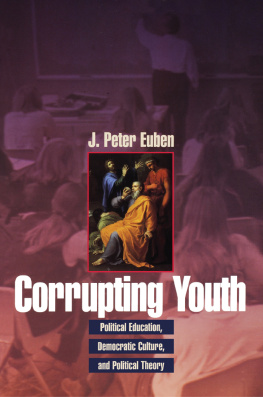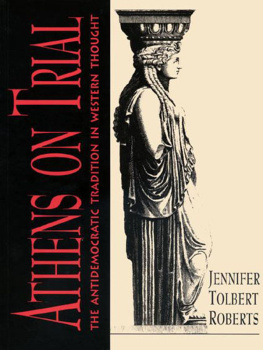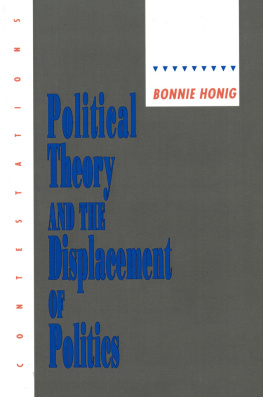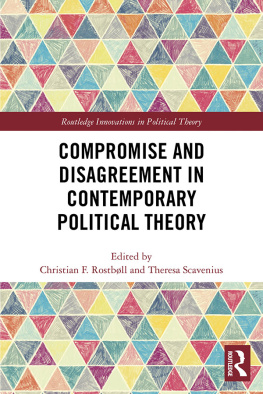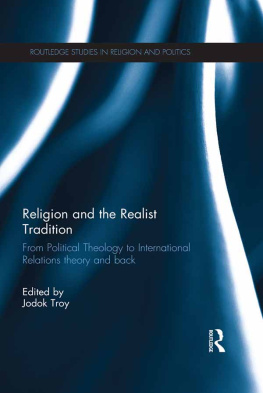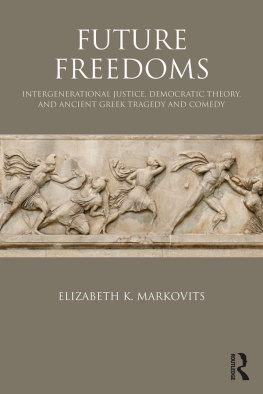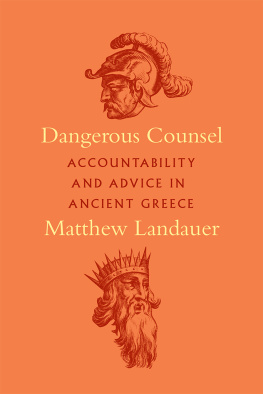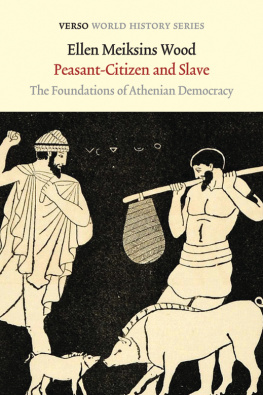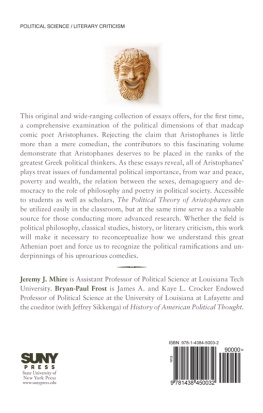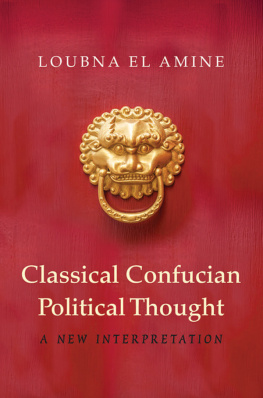Corrupting Youth
Corrupting Youth
POLITICAL EDUCATION,
DEMOCRATIC CULTURE, AND
POLITICAL THEORY
J. PETER EUBEN
PRINCETON UNIVERSITY PRESS
PRINCETON, NEW JERSEY
Copyright 1997 by Princeton University Press Published by Princeton University Press, 41 William Street, Princeton, New Jersey 08540 In the United Kingdom: Princeton University Press, Chichester, West Sussex All Rights Reserved
Euben, J. Peter.
Corrupting youth : political education, democratic culture, and political
theory / J. Peter Euben.
p. cm.
Includes bibliographical references and index.
ISBN 0-691-01202-4 (cloth alk. paper) ISBN 0-691-04828-2 (pbk. alk. paper) 1. Political scienceGreeceHistory. 2. DemocracyGreeceHistory. 3. Politics and literatureGreeceHistory. 4. Political plays, GreekHistory and criticism. 5. Political socialization. I. Title.
JC73.E93 1997 321.8'01 dc21 96-54911 cip
eISBN: 978-1-400-82233-1
R0
TO THE MEMORY OF
MY GRANDFATHER JOSEPH FEINGOLD MY SISTER JULIE ANN EUBEN FRIEDFELD MY COUSIN ELLEN ROTH REISMAN MY FRIEND AND COLLEAGUE RICHARD GORDON
ALL OF WHOM DIED OF
TERRIBLE ILLNESSES
WITH A COURAGE THAT CONTINUES
TO GIVE STRENGTH TO THE
MANY WHO LOVED THEM
And this thinking, fed by the present, works with the thought fragments it can wrest from the past and gather about itself. Like a pearl diver who descends to the bottom of the sea, not to excavate the bottom and bring it to light but to pry loose the rich and the strange, the pearls and the coral in the depths, and to carry them to the surface, this thinking delves into the depths of the pastbut not in order to resuscitate it the way it was and to contribute to the renewal of extinct ages. What guides this thinking is the conviction that although the living is subject to the ruin of the time, the process of decay is at the same time a process of crystallization, that in the depth of the sea, into which sinks and is dissolved what once was alive, some things suffer a sea-change and survive in new crystallized forms and shapes that remain immune to the elements, as though they waited only for the pearl diver who one day will come down to them and bring them up into the world of the livingas thought fragments, as something rich and strange, and perhaps even as everlasting Urphnomene.
Hannah Arendt, paraphrasing Walter Benjamin
PREFACE
I
There is much talk these days about corrupting youth: about who is responsible for their supposedly bizarre tastes in music and dress, their addiction to drugs, television, and promiscuous sex, their hedonism and contempt for authority, their general selfishness and irresponsibility, and their indifference to or cynicism toward public life, the public good, and public education. The harrowing immoralism of the movie Ki ds seems but a mild exaggeration of what has been done to or has happened to them.
One variant of this general complaint focuses on the politicization of secondary and higher education and the displacement of classical texts in the education of the young, or at least those of the young who go to elite private schools, selective public schools, or four-year colleges and universities. Here the contest is over what students should read and why they should read it, who should teach them, how, where, and for how long. The more general question behind these concerns is about the purpose of especially public education in a more or less liberal democratic polity. Is the purpose of such an education to inculcate citizenship or teach technical skills, focus on the liberal arts and the cultivation of character or on vocational training to insure productive workers? Who appropriately sets the terms of this debate? Who should have a significant voice or even the final word in it?
In many respects these questions and concerns are as old as our Republic. Mostly they remain white noise. But at times such as our own, their hum becomes a full-throated lament. Then it becomes evident once again how much of our self-fashioning and representation of who we are, hoped to be, and blessedly were not (e.g., a class society) is tied to our conception of education.
This book is meant to participate in the current debate. But it does so in a particular if not peculiar way, since its points of reference are Athenian democracy, Socrates, and classical drama and political theory.
As for the first, I suggest certain historical parallels between the sophistic challenge in fifth-century Greece, which, perhaps for the first time in the West, forced people to think systematically about education as a distinct activity and our own educational crisis. That the challenge occurred in the context of debates over the meaning of democracy and in the midst of recriminationswonderfully parodied in the Clouds, where the debate between Old and New Education sounds like that between the National Association of Scholars and their multiculturalist criticsover who is corrupting the young adds substance to the parallel. As for Socrates, he is the one most memorably accused of corrupting the youth, a charge he turns against his accusers, thereby raising the question of what we mean by corruption and what is presupposed by the claim that someone or some force is corrupting the young. Since I will take Socrates as a paradigmatic political educator of a democratic polity (at least most of the time and until the final chapter), the charges against him and his response to them frame the issues of this book.
In regard to classical texts, I am less interested in making an abstract argument for their usefulness than in attempting to demonstrate it by thinking about contemporary political and theoretical issues through and with them. Most of the time I focus on a particular issue and text (such as rational actor theory and Oedipus Tyrannus), but in one case, that of Antigone, my intention is simply to indicate how generative such a text can be.
There is of course something problematic about relying on Athenian democracy, Socrates, and classical texts as a point of reference. Why yet again privilege what has been privileged all along, and just at a time when there are good reasons to think with and through other societies, figures, and texts? More pointedly, why have recourse to a democracy that was far less democratic than its defenders (who have in fact been very few indeed) suppose it to be? And is it not incongruous, even dangerous, to insist on parallels between a small premodern city-state and a modern state? Surely such parallels can be manufactured only by sacrificing historical precision and institutional specificity. For instance, the closer one looks at Greek religion, modes of warfare, communication, the economy, and kinship structures, the more surface similarities dissolve into a disquieting otherness or straightforward irrelevance.
J.G.A. Pocock tells the story of how Renaissance humanists, who were drawn to the study of antiquity by the expectation that they could find exemplars by which to model their own lives, found that the more closely they studied the past they revered, the more it receded before them, until its particularities overwhelmed any possible relevance for the sixteenth century. The techniques of historical scholarship they developed to mine the wisdom of the Romans undermined their initial assumption and purpose. Moreover, their refusal to accept what their scholarship revealed and persistence in trying to mimic the past led to a pedantic academism that provoked writers like Bacon and Hobbes to reject the past in the name of a self-sufficient modernism.

